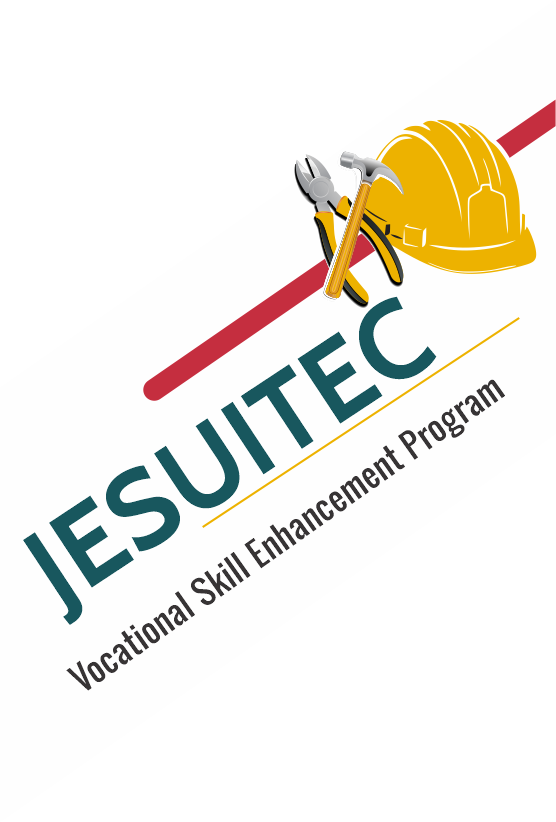JesuiTec
Background
Around thirty years back, a group of Jesuits with an idea to mainstream the youths from informal to formal job market, started with a skilling institute. They named it Jesuitec, since then, imparting skills in youth through training programs in one of the key agendas of our organization. Courses run are industry
Our Philosophy
- Equipping the unskilled youth with employable skills and knowledge in order to reap the demographic dividend and contribute substantively to the growth of the country and thereby to nation building.
- To bridge the gap between required workforce and lack of skilled workforce by skilling, re-skilling and up-skilling especially those from the underprivileged sections of the society.
- Offering holistic and skill-based education in order to help our under-privileged youth not only employable but also empowered and transformed to become agents of transformation.
- Skill training along with youth accompaniment through personal guidance, career counselling, personality development programs, promotion of dignified livelihood and becoming of agents of social change.
- Networking of all our skill centres to offer a standardized skill training program, creating a model skill training institution as well as setting a new bench mark across the country for skill training.
The Model
From our inception, we have been following a model which is robust, adaptable and output oriented. With time changes have been made and now we have a sophisticated and industry trend oriented model.
First phase of this cycle Skill cycle starts with identifying the industry needs and their requirements. Once it is done community is mobilized and engaged and youth is motivated to come forward, it is followed by counselling the youth and understanding their course preference.
Second phase of the cycle begins with training of trainers, so that they impart the best of the trainings. After that actual training of the youth takes place, this involves theoretical as well as practical training. Training ends by the assessment done by the institute and givning them the certification.Third and final stage of the cycle starts with placing the youths at the right place.And building new networks in the companies through alumni.
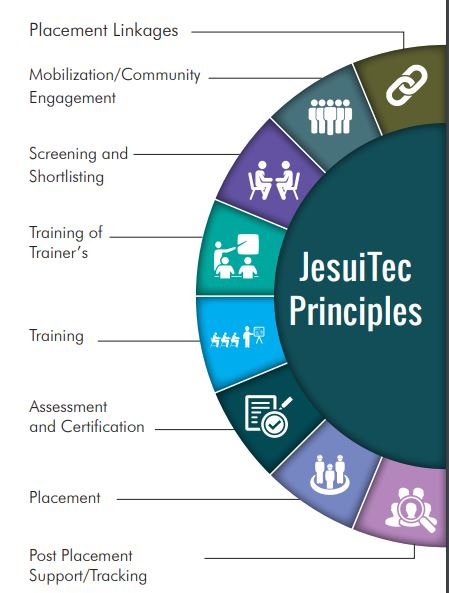
Diagram representing Skill Cycle
Presence in India
We are present in 12 states in India and 29 skilling institutes.
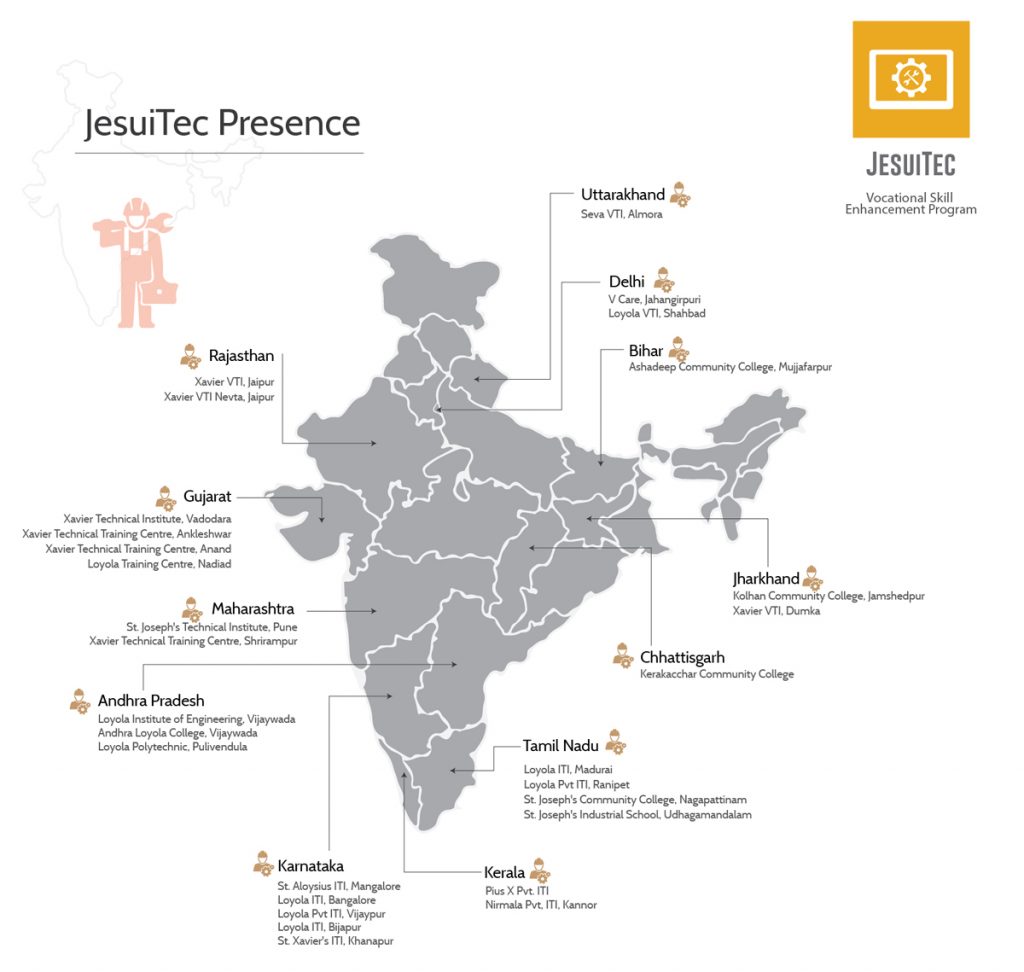
Impact
To present we have skilled more than 500000 youths in India. We have our presence in 18 states and have established 29 skilling institutes and we are functional for last three decades. We are providing reaching to 18 different industrial trades and in total we offer 42 courses. Listing is as below-
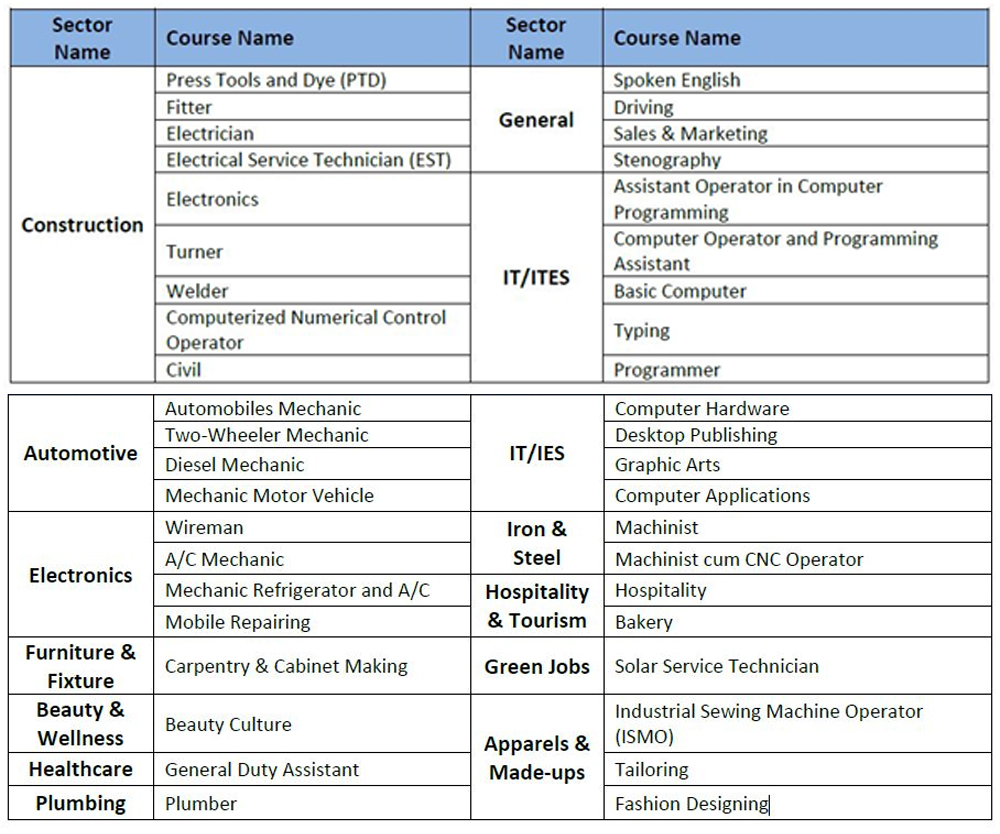
Industrial and Placement partners
We are well connected to the industries for providing industrial exposure and placement of the youths trained at our institutes.
Few of them are-
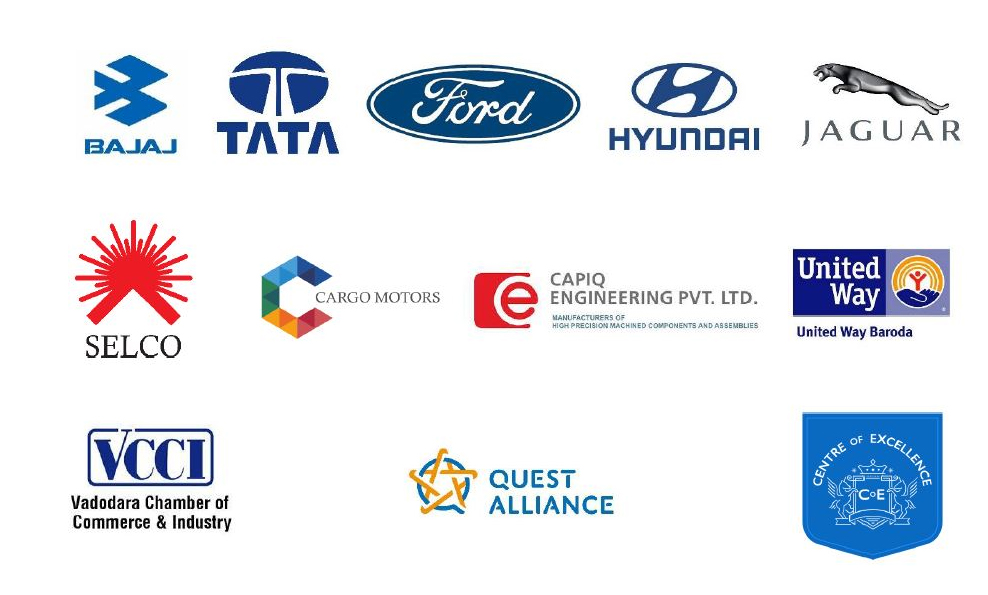
Skilling and More
JesuiTec
Vocational Skill Enhancement Program

29 Formal Technical Institutes

Benefiting over 7000 children each year

85% Placements
The Jesuits are providing formal training courses like Nursing, Hospitality, Computer Hardware, fashion designing, Beauty Culture, Automobile Mechanic, Solar panel technicians, etc through 29 technical training institutes and 253 community colleges across nation. The courses, recognized by Central and State Govt’s are designed on current demand in market for skilled personnel.
Jesuit Conference of India with these two channels bestow technical training to the youth
Technical Institutes
Community Colleges
Type of courses offered
Formal courses are full-time courses of two years duration. Students with a minimum qualification of 10th standard are eligible to enrol in the courses whose syllabus is fixed in nature. A course Completion Certificate is provided by the Central Government.
Non-Formal courses are full-time courses of two years duration. Students with a minimum qualification of less than 10th standard can enrol in the courses whose syllabus is flexible. A course Completion Certificate is provided by the respective institution.
The NSDC certified courses are of three months duration. Students after passing out from 8th standard can enrol in any course whose syllabus is flexible. A course Completion Certificate is provided by NSDC and recognised by private organisations.
The NIOS certified courses are of six to ten months duration. Students after passing out their 8th standard and SSC can enrol in any of the courses offered whose syllabus is partly fixed in nature. A course Completion Certificate is provided by NIOS and recognised by both private and government organisations.
List of courses offered:
Community Colleges
Considering the high dropout rate in the formal education system, the Jesuits over the last two decades have promoted Community Colleges that offer a distinct learning environment, and are recognised for smaller size classes, more individualised attention and a supportive atmosphere.
The Indian Centre for Research and Development in Community Education set up in 1999, has 253 Community colleges in18 states of India through which 125,006 students have passed out. Partnering with the skills training initiative of the Government of India, Indian Centre for Research and Development in Community Education is now an accredited partner of the National Skills Development Corporation and several community colleges are now recognised training centres of it.
Institutions Under JesuiTec
Loyola Vocational Institute, New Delhi
Loyola Vocational Institute, New Delhi is approved by Government of India and is affiliated by NIOS since 1996. LIV offers diverse number of programmes in the fields of home sciences, typing, tailoring, personal development, fashion designing, beauty culture, electricians and many more. The time duration of the courses varies from 06 months to a maximum of 2 years.
V-care, Jahangirpuri, New Delhi
V-Care focuses on the remote communities of the northern areas of Delhi. The institute offers formal training in computers, typing, stitching, tailoring and Beauty culture. Apart from this, the institute also assists and supports Self Help Groups in the remote areas of Jahangirpuri, Bhalswa and Burari areas of North Delhi.
Ashadeep Community College, Muzaffarpur, Bihar
Loyola Vocational Institute, New Delhi is approved by Government of India and is affiliated by NIOS since 1996. LIV offers diverse number of programmes in the fields of home sciences, typing, tailoring, personal development, fashion designing, beauty culture, electricians and many more. The time duration of the courses varies from 06 months to a maximum of 2 years.Ashadeep Community College, Muzaffarpur, Bihar, is working with the marginalised communities in Patna, Bihar by providing them short term vocational training for the duration of three months. Apart from that, the institute has collaborated with corporates for internship programmes of their student and holds 80% placement records.
Xavier Technical Institute, Sevasi, Gujarat
St. Xavier’s Technical Institute, Sevasi, Vadodara, Gujarat, primarily focus on the skill training and vocational development of the youth to generate employment in the formal sector. The institute offers courses like Press Tools and Dye making, Electrical Service Technician, Advanced Automobile Engineering, FITTER, Turner, Solar Electrical Service Technician, Electrical Installation Wiring and Jointing.
Xavier ITI, Srirampur, Maharashtra
St. Xavier’s Technical Training Centre, Srirampur, Ahmednagar, Maharashtra is a multi-disciplinary industrial training institute (ITI) focusing on actionable engineering programmes. It aims to deliver well-trained engineers who are able to influence across organisational boundaries. The institute is founded to cope up with the need for vocational education in the country. The institute offers courses like Diesel Engine Mechanic, Electronic and Radio Servicing (L.E.R.S.), Computer Operation with M.S. Office, Lathe Machine Operator, Welder Cum Fabricator, Welding (Gas and Electric).
St. Joseph’s Technical Institute, Pune, Maharashtra
St. Joseph’s Technical Institute, Pune, Maharashtra, established in 1959 contributes towards producing high-quality shop-floor workers and supervisors to the industries in Pune and adjoining industrial hubs of Maharashtra. The institute is a member of Skills for Progress, an all-India association of private technical and vocational training institutes. It prepares students for the National Council for Vocational Training (NCVT) examination in the craftsmen training schemed courses of the Maharashtra State Board of Vocational Examinations.


